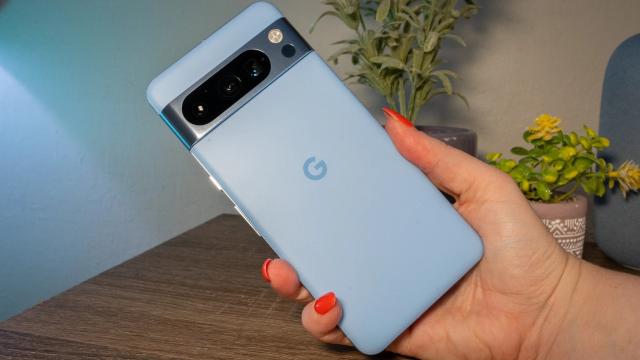If you’re the proud owner of a Google Pixel 8 Pro—or are soon to be one this holiday season—you’re about to be the latest guinea pig for the company’s big AI experiment. Google’s flagship Android phone is going to be held aloft in a sweeping round of new AI capabilities thanks to the company’s new Gemini AI model. The company says several AI features will start to run directly on users’ devices starting Wednesday.
Google revealed Wednesday its new powerful AI Gemini Pro and Gemini Ultra, but the runt of the litter also shown is called Gemini Nano. It’s the smallest version of the company’s latest AI release built for “on-device tasks” while running directly on the Pixel 8 Pro’s Tensor G3 processor, according to Dave Burke, the vice president of engineering on Android. He stressed this means that each phone is its own contained silo of AI and that users’ data won’t end up leaving their device to get processed by a foreign server. It also means you can access the AI features without needing to connect to the internet.
So, what are those features? Burke says Nano will be able to provide text summarization, smart replies, and AI-enhanced spell check. For example, Nano will summarize users’ audio files in the Recorder app. It will also power the Smart Reply feature on Gboard for Pixel 8 Pro users. That system is also interoperable with other apps, and Google says that Smart Reply is going to be available in WhatsApp to start. All this should be available on Pixel 8 Pro phones, and even more apps should also get access to AI replies next year.
Most AI like ChatGPT is so intensive it needs to operate on separate servers rather than on-device. While chatbot responses aren’t exactly slow, they sometimes take a few seconds to respond to more intense prompts. Running on-device could potentially speed up those wait times, though Gizmodo has yet to test out all its capabilities.
Android 14 is also getting upgrades to handle all these background AI tasks. Part of this is the Android AICore that connects with Gemini Nano, a backend support platform meant to enable more Google AI and app integration. Google touted how it should make use of newer, non-Tensor chip’s like Qualcomm’s Snapdragon 8 Gen 3. Other Android-based phones like the upcoming Samsung Galaxy S24 will likely include that company’s own AI chatbot, coding bot, and image generator.
Google’s own Pixel 8 phone was supposed to be the first real “AI phone,” or at the very least the smartphone designed to facilitate the Mountain View tech giant’s big generative AI push. Only, both the phone and the Android 14 release were rather light on AI capabilities at launch. The phone came with a simple, heavily restricted generative desktop wallpaper maker as well as some AI-enabled photo enhancement tech. Other features like Bard chatbot integration with Google Assistant were kept restricted to a few early testers.
So we still have yet to get the full impression of an AI-enabled assistant on most phones, though Brian Rakowski, Google’s VP of product management for Pixel, said Gemini will power Assistant with Bard “early next year.” Smart reply and article summaries have already been present in Gmail, Docs, YouTube and more through Chrome extensions for close to half a year. Google says Bard will get better thanks to Gemini, but the big search with AI experiment remains in a closed beta under the company’s Search Generative Experience banner.
The AI-enabled assistant may be the next big use-case for AI, especially if it runs natively on users’ devices. Microsoft has its GPT-4-enabled Copilot AI, but that is tied to software like Windows or Bing rather than native hardware. Imagine talking to your phone to get it to copy text or navigate through some fiddly apps. It could prove a sea change in how users operate their phones, so long as it works as advertised.
Despite all the hubbub about the biggest, most capable AI models, natively running AI might be the next big benchmark for user-end AI. Most of the major chipmakers are touting the AI processing power of their new CPUs, though in reality the next-gen chips like the Snapdragon 8 Gen 3 don’t offer many unexpected upgrades over the previous generation. Instead, making AI on mobile is a process of paring down these models to fit on limited hardware, and every company wants a piece of that pie. While it hasn’t made much mention of AI this past year, the company is reportedly working on an open-source AI model engineered to work best on the company’s own M-series desktop chips.
